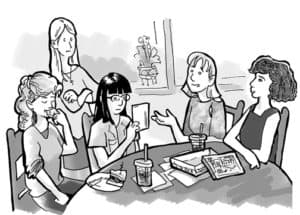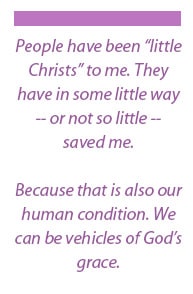This chapter is the most important one in the book. Everything else has led up to it or provided some other kind of support for it. But this chapter contains Xenia’s moment of truth. Whatever heart and soul the book have reside in that, if they’re anywhere at all.
Before we examine that more carefully, let’s look back at the questions I was looking to solve in this book. I’ll save you having to go all the way back to the first blog-post in this series. Here’s the excerpt I wrote about Xenia’s problem:
When I begin any of these books in the series, there are a couple of questions I’m looking to answer. In spite of how different the five girls are from each other, the questions are basically the same:
-
-
- What would it take to wake this person up to the reality of Jesus Christ, alive and present in every moment?
- What do I wish someone had told me when I was her age?
-
In Xenia’s case, those questions made me consider the issue of socialization. How you get along with others … how you make friends … how you deal with strangers. Because as smart as she is — and there are a good many children with above-average intelligence like her — she does have a “people problem.” So, how did I address these issues?
 First of all, by creating a kind of artificial environment where Xenia would be thrown in with grown-ups and those her age, none of whom she knew. She would have to begin to deal with them. That would take the form of a series of puzzles to solve, because that’s Xenia’s way and because it might be the way a gamer would attack the problem. But at bottom, the issue is the same. How do you begin, as a rather unemotional person but a devout Christian, to get to know people, and — here’s the tricky part — to love them as Christ loves us?
First of all, by creating a kind of artificial environment where Xenia would be thrown in with grown-ups and those her age, none of whom she knew. She would have to begin to deal with them. That would take the form of a series of puzzles to solve, because that’s Xenia’s way and because it might be the way a gamer would attack the problem. But at bottom, the issue is the same. How do you begin, as a rather unemotional person but a devout Christian, to get to know people, and — here’s the tricky part — to love them as Christ loves us?
To answer my questions in reverse order, what I wish someone would have told me when I was her age is that people do NOT make that easy. Whether you’re talking about children or adults, friends or strangers, you find that people can really disappoint you. Particularly if you go at things in a very naive and self-conscious way, thinking that you will offer a nice Christian type of brotherly or sisterly kindness and be rewarded for it. That’s when you’re likely to find out that other people can be just as contrary, self-centered, illogical and annoying as you are. What a terrible discovery that can be! So many good intentions — Christian and non-Christian — fall apart at this juncture. When expectation meets reality, it can be a complete train wreck.
And to make things worse, the bad behavior you encounter is not just the benign, harmless kind. Most of it certainly is — think of CJ’s posturing and Shar’s shallow conniving. But sometimes, much worse things sneak in there. Other kids your age — sometimes those you thought were your friends — can show a streak that’s not just clueless, but downright cruel. Along with finding out that people are difficult to love comes the even more disturbing discovery in adolescence: there is evil in the world.
This, I always thought, is what it would take to bring Xenia out of her complacency and apathy. Along with encountering some tacky and superficial people, she accidentally comes up against something much worse. She is hardly even aware of what has happened. She experiences it, really, as a kind of force.
She sensed it from the beginning. At a gut level, she was repelled by Mr. Rogers from the first time she met him, though she couldn’t have said why. That is really what Charlie detected in her, at the first meeting of the Society. Here was someone who saw right through his father’s subterfuge — his elaborate fake-outs and self-importance. From that point on, Charlie is aware of Xenia as a possible lifeline. Especially when he begins to find out more about her — Mrs. Higg saying that she helped solve an important mystery; Xenia showing how intrepid and resourceful she can be — he starts to hope that Xenia can get him out of the prison he’s in. To circle back to one of the unanswered questions we have had, that is really the reason that Charlie was always watching Xenia. It wasn’t hostility, or fear, or even some romantic attraction. It was more important than that. He saw in her a possible savior.
Becoming a ‘little Christ’
We’ll have more to say about Charlie’s situation in the next two blog-posts. But for now, consider how he is the catalyst for answering question #2. What would make someone like Xenia come to see that Jesus Christ — whom she has heard about in church all her life — is not some abstract figure? That His saving death and resurrection are not irrelevant historic events? It might just be this: to be in the role of a savior to someone who badly needs one.
I don’t think of this as being a blasphemous proposition. At least, I hope not. I think it happens all the time. Given enough time, we all find moments when we may be this for someone else. It is not usually as obvious as I have made it here. For the purposes of good fiction, I had to paint with a broad brush. I didn’t want anyone to miss the point.
But I know that other people have filled this role for me. Sometimes they’re aware that they did, but usually not. Other people have been “little Christs” for me. Anyone can be a vehicle of grace. Often, they don’t even know that’s what they are. But people have, at the most unusual times, saved me. At least a little bit. Sometimes, a lot. Because that is also part of our human condition. We can be fallen; we can be evil. We can also be salt and light. We can be vessels for God — His hands, and His voice.
If that has happened to you, especially if it happened in a very dramatic way, you never forget it. At that moment, you know that it wasn’t you. Or … not exactly. You probably weren’t a passive instrument. But the good that came through your actions had a life of its own. It seemed to flow through you, and come from an outside source. I hope people know what I mean by this. It’s very hard to put into words. But you know it when it happens.
A little help from her friends
 In Xenia’s case, the situation was particularly extreme. And so, there was one last thing that I figured out about Xenia’s moment of truth. From the very beginning, I had been thinking that someone like Xenia would need spiritual guidance, but in a form that she could accept. She had already needed to channel Maggie’s gentle way with children. When she is brought to a place of complete terror and despair, she needs to remember Photini. Not just because Photini prays, but because Photini makes Xenia believe in prayer. And because of her humility. Photini is never afraid to ask for help. That’s what Xenia needs to do. She will never be able to rescue Charlie without God’s help, but she has to remember what she told Charlie just the day before: If you don’t know what to pray, at least be honest.
In Xenia’s case, the situation was particularly extreme. And so, there was one last thing that I figured out about Xenia’s moment of truth. From the very beginning, I had been thinking that someone like Xenia would need spiritual guidance, but in a form that she could accept. She had already needed to channel Maggie’s gentle way with children. When she is brought to a place of complete terror and despair, she needs to remember Photini. Not just because Photini prays, but because Photini makes Xenia believe in prayer. And because of her humility. Photini is never afraid to ask for help. That’s what Xenia needs to do. She will never be able to rescue Charlie without God’s help, but she has to remember what she told Charlie just the day before: If you don’t know what to pray, at least be honest.
So she starts there, with a cry from her soul. That allows her to move in little steps, from that helpless prayer to the Jesus Prayer. From the Jesus Prayer to the recollection of Fr. Andrew’s words to her. That’s the point at which she can open her eyes and see a kind of angel, in a form she recognizes. This “Vanessa” tells her one thing Xenia knew in her heart of hearts — that she can’t leave Charlie behind. She just can’t. If she does, Rogers will take him away, and Charlie will probably never escape.
The other information from “Vanessa” is nothing any human being would know. It’s a line I didn’t know I was going to write until it came out.
“I can’t, Vanessa! I can’t. He’ll kill me. You haven’t seen him. I can’t — ”
Nothing had stopped her from talking, but she left the sentence unfinished all the same. Vanessa was watching her with infinite kindness.
“Don’t be afraid,” she said. “Go and save him. Because he, too, has prayed.” (page 397)
Remember that part. We’ll need to revisit it, in the last blog-post.
It may not even be that much of a surprise, after all that, that Abigail makes an appearance. Who else could possibly get Xenia to do something nearly impossible, other than someone that never seems to let impossibility get in her way? And who has always, since the ETC’s humble beginnings, been its storyteller? I said that I needed Abigail to be ill in this book. That’s because I always envisioned her particular gifts as being at their most focused, and being physically infirm seemed like the best way to do that. She alone is aware that something has gone very wrong. I’ll leave it up to the reader’s imagination just how much Abigail actually knows, when she jumps up at Ms. Weeks’ house and begins pacing anxiously about. Personally, I don’t think it makes much difference. She’s Abigail — she just knows things. When we get into the next chapter, Father Andrew will give some perspective, and then, perhaps, we’ll know things as well.
I’ll just draw attention to one last item. All through the book, Charlie’s father had been Mr. Rogers, or sometimes Dennis. But once I had written in chapter 21 about who he really is, the things he had done, I couldn’t bring myself to refer to him by those names anymore. It normalized him too much — made him sound like a neighbor, or a regular guy. From this point forward, both Xenia and everyone else who speaks about him call him Rogers. I consciously wanted to make Mr. Rogers less “like folks,” because it becomes more obvious that he has become a kind of devil incarnate. His son, of course, calls him “Dad,” up to the very end. In that, as in so many other things, Charlie has no choice. But that, too, is a topic best dealt with in the next post.
Getting over coronavirus!
As a quick update, I continue to recover from the nasty coronavirus. I can go ahead and add the dates back in for these last two posts. Not that it means a lot at this point — we’re so very close to the end of this series — but it represents a kind of progress to me, and I’m happy to draw attention to it.
Coming up:
Wednesday — Chapter 23: Answers in the aftermath. Detective Jake and Fr. Andrew help make sense of things
Friday — Epilogue: The beginning that comes after the ending
